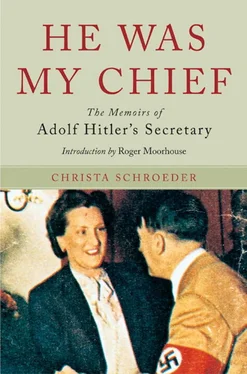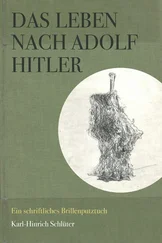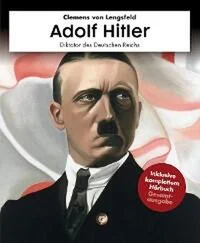Christa Schroeder - He Was My Chief - The Memoirs of Adolf Hitler's Secretary
Здесь есть возможность читать онлайн «Christa Schroeder - He Was My Chief - The Memoirs of Adolf Hitler's Secretary» весь текст электронной книги совершенно бесплатно (целиком полную версию без сокращений). В некоторых случаях можно слушать аудио, скачать через торрент в формате fb2 и присутствует краткое содержание. Город: Barnsley, Год выпуска: 2012, ISBN: 2012, Издательство: Frontline Books, Жанр: История, Биографии и Мемуары, на английском языке. Описание произведения, (предисловие) а так же отзывы посетителей доступны на портале библиотеки ЛибКат.
- Название:He Was My Chief: The Memoirs of Adolf Hitler's Secretary
- Автор:
- Издательство:Frontline Books
- Жанр:
- Год:2012
- Город:Barnsley
- ISBN:978-1-7830-3064-4
- Рейтинг книги:4 / 5. Голосов: 1
-
Избранное:Добавить в избранное
- Отзывы:
-
Ваша оценка:
- 80
- 1
- 2
- 3
- 4
- 5
He Was My Chief: The Memoirs of Adolf Hitler's Secretary: краткое содержание, описание и аннотация
Предлагаем к чтению аннотацию, описание, краткое содержание или предисловие (зависит от того, что написал сам автор книги «He Was My Chief: The Memoirs of Adolf Hitler's Secretary»). Если вы не нашли необходимую информацию о книге — напишите в комментариях, мы постараемся отыскать её.
He Was My Chief: The Memoirs of Adolf Hitler's Secretary — читать онлайн бесплатно полную книгу (весь текст) целиком
Ниже представлен текст книги, разбитый по страницам. Система сохранения места последней прочитанной страницы, позволяет с удобством читать онлайн бесплатно книгу «He Was My Chief: The Memoirs of Adolf Hitler's Secretary», без необходимости каждый раз заново искать на чём Вы остановились. Поставьте закладку, и сможете в любой момент перейти на страницу, на которой закончили чтение.
Интервал:
Закладка:
Wiedemann made several trips abroad. He flew to the United States a few times and frequently to England. The impressions he got there led to his becoming ever more downbeat when speaking to Hitler. In contrast to the positive Brückner, whom Hitler called ‘my ultra-optimist’, his replacement was soon labouring under the designation ‘my ultra-pessimist’. In January 1939 Hitler could stand no more and told Wiedemann that in his closest circle he could not use a person not in agreement with his policies. For this reason Wiedemann was sent as consul-general to San Francisco. In late 1941 he returned to Germany, from where he was next sent in the same role to Tientsin in China. In 1945 the Americans fetched him home as a witness for the Nuremberg trials.
As already mentioned, after taking power Hitler required a properly trained manservant whom he found initially in Karl Krause. [32] Karl Krause (b. 5.3.1911 Michelau). 1.4.1931 Reichsmarine; 1.8.1934 selected as manservant for Hitler; September 1934 at Obersalzberg with rank of SS-Obersturmführer; 10.9.1939 dismissed by Hitler for lying; 1.3.1940 returned to Kriegsmarine; 2.11.1940 to LSSAH Waffen-SS as Oberscharführer; December 1943 to 12.SS-Panzer Div. Hitler Jugend; 1945 SS-Untersturmführer and highly decorated; June 1946 released from Allied internment.
When dismissed, Krause was replaced by Hans Junge [33] Hans Hermann Junge (b.11.2.1914 Wilster/Holstein, fell 13.8.1944). 1.11.1933 joined SS; 1.8.1934 volunteered for LSSAH; 1.7.1936 with SS-Begleitkommando Der Führer; from 1940 orderly to Hitler; 19.6.1943 married Hitler’s secretary Gertraud Humps; 14.7.1943 drafted into Waffen-SS; 1.12.1943 12 SS-Panzer Div. Hitler Jugend, SS-Obersturmbannführer; killed in action.
and Heinz Linge, [34] Heinz Linge (b. 23.3.1913 Bremen, d. 1980 Bremen). 17.3.1933 entered LSSAH; 24.1.1935 manservant to Hitler, remained at FHQ to the end; 2.5.1945 Soviet PoW; released 1955.
although these men were known as orderlies. After Krause, Hitler’s servants and orderlies were drawn from the SS-Leibstandarte Adolf Hitler (LSSAH) [35] On 17 February 1933 a private bodyguard for Hitler consisting of 117 selected SS-Führer and SS men was formed into the SS-Sonderkommando Berlin under SS-Gruppenführer Dietrich. Accommodated initially in the Friesen Barracks in Berlin, the SS-Sonderkommando moved to the cadet academy at Lichtenfelde in April 1933. The on-duty guard was stationed in the Inner Court at the Reich Chancellery. On 3 September 1933 the SS-Sonderkommandos were consolidated into the Adolf Hitler Standarte, renamed LAH on 9 November 1933 with 835 men, and from 13 April 1934 LSSAH, although in general conversation the ‘SS2’ was dropped.
having been selected by Sepp Dietrich, LAH commander, for service with Hitler. They had to look good, be tall if possible, blond and blue-eyed, capable and intelligent. From the men selected by Dietrich, Hitler would then choose the ones he wanted. A few months at the Munich-Pasing servant training school made them into perfect servants.
A valet’s duties consisted of attending to Hitler’s personal requirements. In the morning at the agreed time Hitler would be awoken by a knock on the bedroom door. The servant would then place newspapers and reports before the door and retire. While Hitler was reading, the servant would prepare his bath and set out his clothing for the day. Hitler would never have a manservant help him dress. In the evening the servant would report to Hitler once all his guests had assembled for dinner. At the Berghof he would always be told: ‘Mein Führer, it is arranged that you will lead in Frau Such-and-Such…’ During the war the servants in the FHQs would invite the participants by telephone to the nightly tea session after the military situation conference. The servants had a very important role to play for the invitees◦– informing them of Hitler’s mood!
From my work space in the Adjutancy I looked down on the fine old trees in the Reich Chancellery park where Bismarck used to stroll. On the other side of the room were the tall wing-doors opening to Hitler’s room and then beyond that to the Congress Hall made famous by Bismarck. At about ten each morning Hitler came through the high wing-doorway at my back from his flat in the Radziwill Palace. He passed through the Personal Adjutancy to reach his study in the Reich Chancellery. Secretary of State Dr Lammers would have drawn up a schedule the day before for the high-level discussions to be held. On his way to these conferences Hitler would always be in haste but on the way back took his time. Mostly he would stand at the large table and look over the materials there. These might be applications for honorary citizenship, presents from supporters and adoring women, pictures, books, handicrafts, artwork, etc. laid out for him there. Often he would give a short instruction or sign those documents appearing to be urgent.
At this time I saw Hitler daily, except for weekends which he usually spent in Munich. He would always give me a friendly greeting: ‘How are you?’ He was not an office or desk person and preferred to hold his afternoon conferences in the Winter Garden strolling up and down with his conversation partners. In fine weather the glass doors would be fastened wide open and his great, bright room used only as a corridor to the Reich Chancellery park.
The Personal Adjutancy was only a liaison and communications centre. Sitting at my work position I knew only rarely with whom Hitler would be having a conference, and it was impossible to have a peep. All important correspondence was kept by Hitler personally in his private room while Schaub kept much more in the strongbox. We secretaries only had access to Hitler’s study for dictation. All political directives and orders for home and overseas Hitler distributed orally to the Reichsleiters, to Himmler, to the ministers or their representatives and to the foreign ministry. The conferences were not tailored to a particular timetable and would often last into the early hours. The conversation partner would then carry out the directive or order, or have it typed up for his signature later. I never learned anything about the measures being introduced and current events, or at least less than the secretaries to the Reichsleiter, ministers and so on. If Hitler’s ‘Basic Instruction’ [36] Hitler issued his ‘Basic Order’ respecting secrecy on 25 September 1941. This was published to all military and Reich centres by the interior minister on 1 December 1941. Part I prescribed: ‘Nobody, no centre, no official, no employee and no worker may know of any secret matter which it is not absolutely necessary for that person to know in the course of his or her duty.’
was enforced strictly anywhere it was in the Personal Adjutancy. When something of importance had occurred, or was about to, then one would get a certain feeling, and the atmosphere would become ominous, or at least so it seemed to me.
The person absolutely in the know in the Adjutancy was Julius Schaub. He was informed about everything and apparently enjoyed his unique privilege. If by chance I got wind of something and was imprudent enough to even think about asking Schaub, he would give me a warning look from the corner of his eye over the spectacles perched low on his nose. I would feel a nasty tightening of the chest should he then decide to investigate further with a ‘What? What’s up?’ Personally that always made me feel threatened and I would try to extricate myself from the business as quickly as possible, perhaps remarking: ‘Oh, I was just wondering.’ One was always groping in the dark for information, rarely getting to know something concrete. Even the trips out would only be announced very shortly before departure. While I was living in Wilmersdorf and had to go back there to pack after a trip came up out of the blue, all the secretiveness created a whirlpool which made me quite nervous.
Читать дальшеИнтервал:
Закладка:
Похожие книги на «He Was My Chief: The Memoirs of Adolf Hitler's Secretary»
Представляем Вашему вниманию похожие книги на «He Was My Chief: The Memoirs of Adolf Hitler's Secretary» списком для выбора. Мы отобрали схожую по названию и смыслу литературу в надежде предоставить читателям больше вариантов отыскать новые, интересные, ещё непрочитанные произведения.
Обсуждение, отзывы о книге «He Was My Chief: The Memoirs of Adolf Hitler's Secretary» и просто собственные мнения читателей. Оставьте ваши комментарии, напишите, что Вы думаете о произведении, его смысле или главных героях. Укажите что конкретно понравилось, а что нет, и почему Вы так считаете.












